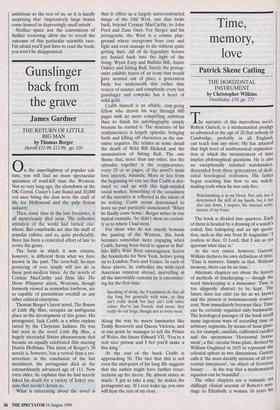Gunslinger back from the grave
James Gardner
THE RETURN OF LITTLE BIG MAN by Thomas Berger Harvill £15.99, £11.99, pp. 320 On the superhighway of popular cul- ture, you will find no more spectacular specimen of road-kill than the Western. Not so very long ago, the showdown at the OK Corral, Custer's Last Stand and 10,000 red men biting the dust were the stuff of life for Hollywood and the pulp fiction industry.
Then, some time in the late Seventies, it all mysteriously died away. The collective attention of the world had turned else- where. But comebacks are also the stuff of popular culture, and so, quite predictably, there has been a concerted effort of late to revive the genre.
The form in which it now returns, however, is different from what we have known in the past. The corn-ball, he-man posturing of yore simply will not do in these post-modern times. As the novels of Cormac MacCarthy and films like The Horse Whisperer attest, Westerns, though formerly viewed as somewhat lowbrow, are as capable of pretentious overkill as any other cultural enterprise.
Thomas Berger's latest novel, The Return of Little Big Man, occupies an ambiguous place in the development of this genre. His protagonist, Jack Crabb, is a white orphan raised by the Cheyenne Indians. He Was last seen in the novel Little Big Man, a hugely successful Sixties phenomenon that became an equally celebrated film starring Dustin Hoffman. This latest of Berger's 20 novels is, however, less a revival than a res- urrection: at the conclusion of the last instalment, the protagonist died at the extraordinarily advanced age of 111. Now even older, he explains that he had merely faked his death for a variety of hokey rea- sons that needn't detain us.
What is interesting about the novel is that it offers us a largely unreconstructed image of the Old West, one that looks back, beyond Cormac MacCarthy, to John Ford and Zane Grey. For Berger and his protagonist, the West is a cosmic play- ground where overgrown boys cuss and fight and even manage to die without quite getting hurt. All of its legendary heroes are hauled back into the light of the living: Wyatt Earp and Buffalo Bill, Annie Oakley and Sitting Bull. Surely the protag- onist exhibits traces of an irony that would bave seemed out of place a generation ack; but underneath this rather thin veneer of nuance and complexity every last gunslinger and cowpoke has a heart of solid gold, Crabb himself is an affable, easy-going fellow who drawls his way through 400 pages with no more compelling ambition than to finish his autobiography simply because he started it. The structure of his reminiscences is largely episodic, bringing forth and killing off characters as the nar- rative requires. He relates in some detail the death of Wild Bill Hickock and the assassination of Sitting Bull. The one theme that, more than any other, ties the episodes together is the reappearance, every 50 or so pages, of the novel's main love interest, Amanda. More or less from the beginning we can see that Crabb is des- tined to end up with this high-minded social worker. Something of the casualness of the narrative is reflected in the idiom of its writing. Crabb seems determined to leave no past participle unmolested: 'When he finally come home', Berger writes in one typical example, 'he didn't show no curiosi- ty as to where I had went.'
For those who do not exactly bemoan the passing of the Western, this book becomes somewhat more engaging when Crabb, having been hired to appear in Buf- falo Bill's Wild West extravaganza, leaves the boondocks for New York, before going on to London, Paris and Venice. In each of these places, he embodies the wide-eyed American innocent abroad, marvelling at all the inscrutable customs he is encounter- ing for the first time:
Speaking of drink, the Frenchmen do that all day long but generally with wine, so they ain't really drunk but they ain't cold sober either: they're just French. And yessir, they really do eat frogs, though not at every meal.
Along the way he meets luminaries like Teddy Roosevelt and Queen Victoria, and at one point he manages to tell the Prince of Wales, the future Edward VII, 'You're a real nice person and I bet you'll make a fine king.'
At the end of the book Crabb is approaching 50. The fact that this is not even the mid-point of his long life suggests that the author might have further resur- rections up his sleeve. He almost states as much: 'I got to take a nap,' he makes the protagonist say. 'If I ever wake up, you sure will hear the rest of my story.


























































 Previous page
Previous page